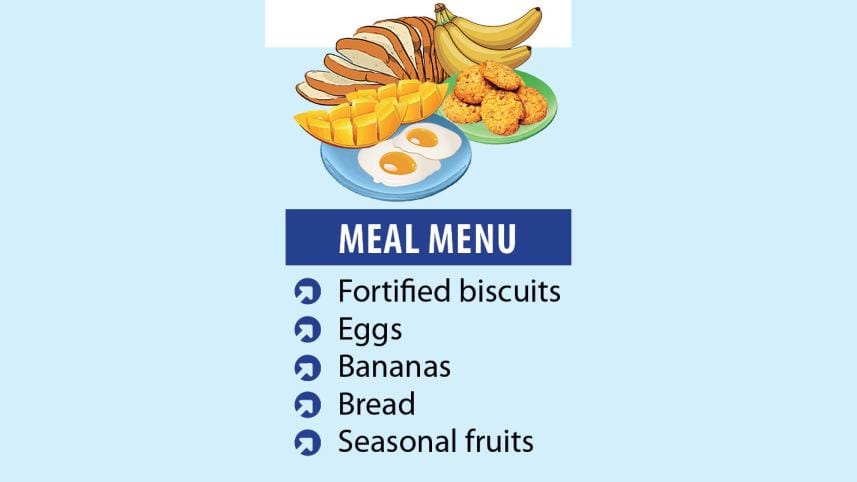Mid-day meal in primary schools returns in Aug

The government is likely to reintroduce mid-day meals at primary schools in 150 upazilas after a gap of two years with the view to ramping up school attendance and bringing down the dropout rate.
The school feeding programme is expected to resume in August, The Daily Star has learnt from primary and mass education ministry officials informed of the proceedings.
The three-year project, which will cover about 37 lakh students at 19,000 government primary schools in mostly poverty-prone areas, will cost about Tk 4,700 crore, according to the ministry's development project proposal.
Of the estimated cost, Tk 4,181 crore will go towards food procurement and the rest will be spent on paying contractors, transport, service charges, food distribution and packaging.
If the project is successful, mid-day meals will be introduced in schools all over the country.
The project will be placed at the next meeting of the Executive Committee of the National Economic Council or the one after that for approval, he said.
"The Planning Commission hinted that the project is likely to get approval quickly since mid-day meals for students are on the priority list of the government," said another top official of the primary and mass education ministry on the condition of anonymity.
The official pointed out that even Finance Minister Abul Hassan Mahmood Ali spoke of the school feeding programme in his budget speech.
The World Food Programme ran a project to feed schoolchildren from 2001 to 2009. The last government school feeding programme was introduced in 2010.
Nearly 30 lakh children in over 15,300 primary schools of 104 poverty-prone upazilas were provided with fortified biscuits, while students in three upazilas received hot meals. The project ran until June 2022.
Before it ended, the ministry concerned in August 2020 prepared a project worth Tk 17,290 crore to feed all students of the 65,566 government primary schools for five years.
It, however, drew criticism from many quarters as it required officials to go on foreign trips to learn how to make khichuri, a local dish that would be served as the mid-day meal.
Subsequently, the project was turned down by Ecnec in June 2021.
"The project was not approved as the prime minister was concerned about its structure [modus operandi]. She said cooking khichuri in schools might hamper academic activities," said then planning minister MA Mannan.
Primary education ministry officials argued that it would be tough for them to provide hot meals as it requires manpower and places for cooking.
However, in the revamped programme that is expected to kick off later this year, the government will not only provide fortified biscuits but also seasonal fruits, bananas, eggs and bread, according to Ahmed, the primary and mass education ministry secretary.
Besides, another school feeding programme for about 2.2 lakh primary school students of Cox's Bazar and Bandarban districts will be introduced in July, said Farid Ahmed, secretary of the primary and mass education ministry..
The World Bank will provide assistance for the project, he said.
"Reintroduction of mid-day meals is a positive step," said KM Enamul Hoque, capacity support and advocacy adviser at the Asia South Pacific Association for Basic and Adult Education.
In Bangladesh, many students attend classes with an empty stomach, which makes it difficult for them to concentrate in the classroom, he said, adding that the mid-day meals will help increase the attendance and nutrition level of students.
"But I think the government should also consider giving hot meals," he added.
In August 2019, the government prepared the National School Meal Policy for government primary schools to ensure children get at least 30 percent of their required daily calorie intake by 2030.
A 2018 study by the World Food Programme showed that mid-day meal programmes resulted in a 4.2 percent increase in school enrolment and a 7.5 percent reduction in dropouts.
The dropout rate at the primary level stood at 13.95 percent in 2022, down from 39.8 percent in 2010, according to the Directorate of Primary Education.




 For all latest news, follow The Daily Star's Google News channel.
For all latest news, follow The Daily Star's Google News channel.
Comments